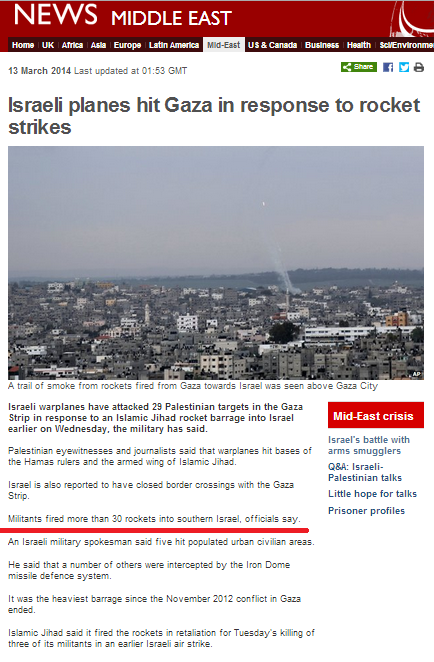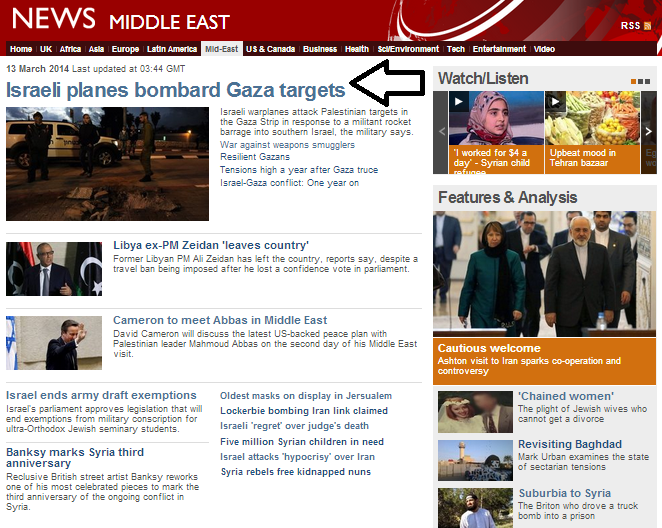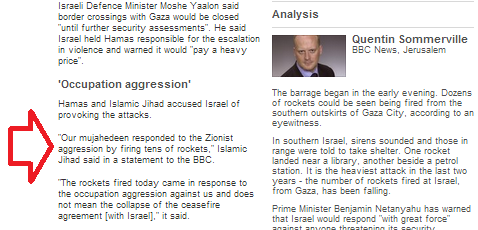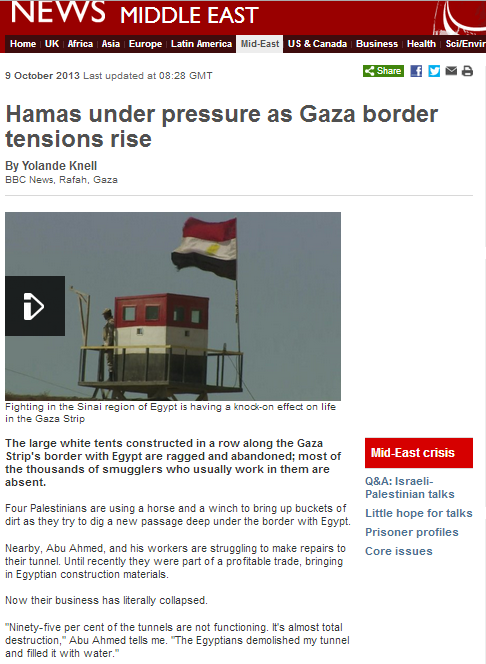“Israeli planes bombard Gaza targets” was the lead headline on the BBC News website’s Middle East page on the morning of March 13th,with no trace to be found of the previous day’s article on the subject of the barrage of missile attacks against civilians in southern Israel begun by terrorist organisations in the Gaza Strip on March 12th and at the time of writing, still ongoing.
That link leads to a somewhat confused report going under the title “Israeli planes hit Gaza in response to rocket strikes“. 
Among the introductory paragraphs to the original version of the report readers found the following statement:
“Militants fired more than 30 rockets into southern Israel, officials say.”
Later on in the report, a different number was presented.
“An Israeli army statement late on Wednesday said that the remains of 60 rockets had so far been found.”
Yes – sixty is definitely “more than 30”, but readers skimming the report’s opening lines during the first eight hours or so of its appearance on the website would have received a misleading impression of the scale of the terrorists’ attacks from the inclusion of that first statement. Appropriately, the number in that sentence was changed to sixty in the updated version of the article.
At two points in the original version of the report the subject of the closure of crossings into the Gaza Strip was raised.
“Israel is also reported to have closed border crossings with the Gaza Strip.”
And:
“The Voice of Israel said on Wednesday that the Israeli Defence Force (IDF) had closed border crossings in response to the rocket attacks.”
In fact, whilst the Kerem Shalom crossing was indeed closed, the Erez crossing remained open for humanitarian cases.
The earlier version of the report stated:
“It [Israeli radio] cited Israeli Defence Minister Moshe Yaalon as saying that Israel held Hamas responsible for the escalation in violence and warned it would “pay a heavy price”.
violence and warned it would “pay a heavy price”.
But Hamas released an equally belligerent statement.
“Our mujahideen responded to the Zionist aggression by firing tens of rockets,” it said.
Speaking to the BBC, the group’s spokesman added: “The rockets fired today came in response to the occupation aggression against us and does not mean the collapse of the ceasefire agreement [with Israel].” “
The version appearing after amendments were made some eight hours later states:
“But Hamas accused Israel of provoking the attacks.
“Our mujahedeen responded to the Zionist aggression by firing tens of rockets,” it said.
Speaking to the BBC, the group’s spokesman added: “The rockets fired today came in response to the occupation aggression against us and does not mean the collapse of the ceasefire agreement [with Israel].” “
Unless the BBC has obtained an exclusive Hamas admission of “firing tens of rockets” unreported by any other media organization, it would seem that it has actually mixed up Hamas with the Palestinian Islamic Jihad. That impression is supported by the fact that the previous day, the BBC used the same quote, but attributed it to the PIJ.
“Israeli warplanes responded by targeting Islamic Jihad positions.
The group said its attacks were in retaliation for Tuesday’s killing of three of its militants in an earlier Israeli air strike.
“Our Mujahideen responded to the Zionist aggression by firing tens of rockets,” they said in a statement.
Speaking to the BBC, the group’s spokesman added “The rocket fired today came in response to the occupation aggression against us and does not mean the collapse of the ceasefire agreement [with Israel].” ” [BBC News, 12/3/13, “Gaza militants fire rocket barrage at southern Israel“]
Like its predecessor, this report provides no background information for readers wanting to understand the context of this latest massive attack carried out by the PIJ and additional terrorist organisations. No mention is made of Hamas’ weakened stature resulting from political changes in Egypt and that country’s campaign against terrorist organisations in the northern Sinai, which has drastically reduced Hamas revenues from the smuggling tunnels. The power struggles in the Gaza Strip between Hamas and other elements including the Iranian-backed PIJ are not explained to audiences and neither are they reminded that the PIJ was by all accounts the intended recipient of the Iranian shipment of missiles, mortars and bullets seized last week aboard the Klos-C or of Hamas’ recent rapprochement with the Iranian regime.
Instead, this report continues in the vein of its predecessor by amplifying the Palestinian Islamic Jihad’s flimsy propaganda, according to which the barrage of dozens of terror attacks with military-grade missiles on the civilian populations of towns and villages in southern Israel is a “response” to the IDF’s targeting of three paramilitary terrorists who launched a mortar attack on soldiers carrying out routine work near the border fence on March 11th.
Also in common with the previous report, this one too downplays Hamas’ responsibility under the terms of the November 2012 ceasefire agreement to prevent missile fire and other terror attacks from the Gaza Strip – and its proven ability to do so when it so wishes.
“Iranian-backed Islamic Jihad and other groups have sporadically fired rockets and mortars at Israel since the 2012 conflict ended, while the Hamas movement that governs Gaza has refrained from doing so.”
The unsourced claim that Hamas has “refrained” from carrying out missile attacks since November 2012 is of course contradicted by the assertion higher up that Hamas issued a statement saying “Our mujahideen responded to the Zionist aggression by firing tens of rockets” and further supports the impression that the BBC has inaccurately attributed that quote.
The report ends by stating:
“Israel pulled its troops and settlers out of the Gaza Strip, now run by Hamas, in 2005. But it maintains a naval and air blockade and restricts the overland movement of people and goods across their shared border.”
No mention is made of Hamas’ terror designation, of the violent circumstances under which it came to “run” the Gaza Strip or of the fact that Israel’s naval blockade and border restrictions came about because of – and after – increased missile fire from the territory in the wake of the Hamas coup which ousted the internationally recognised representatives of the Palestinian people.
Violent incidents such as the one initiated by terrorists in the Gaza Strip on Wednesday afternoon are confusing. The public is swamped by a plethora of often conflicting media reports produced under rapidly changing circumstances in which the facts are not always clear. The BBC claims to be “the standard-setter for international journalism” and professes to help audiences “remain informed about world events” and to enhance their “awareness and understanding” of those events.
Beyond the factual inaccuracies and conflicting information appearing in the BBC’s two reports so far on this latest round of terror attacks from the Gaza Strip, audiences will also remain none the wiser as to the event’s context and background dynamics because it has elected to refrain from providing information of any worth concerning the bigger picture in favour of the unquestioned repetition of propaganda put out by an internationally recognized terrorist organization.
Update:
A correction has now been appended to the article.







